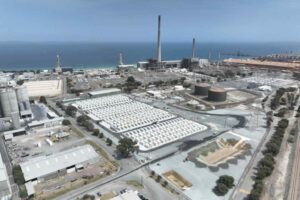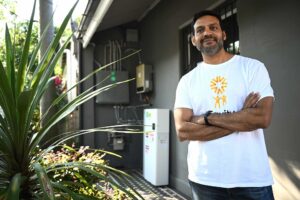Oil drilling and associated development of oil in the Australian Bight will be decided by an approval system which is totally inadequate in the complex world of today.
The current proposed development supported in principle by the policies of both major political parties and by the SA government was in effect announced to the South Australian public by its only newspaper.
In March, the Advertiser had a two-page spread plus editorial extolling the benefits of the economic development and jobs. In the wake of concern expressed by the public and many eminent Australians, Mr Shorten has said that if he is elected his Government would hold an Enquiry on the matter.
In a submission to NOPSEMA, Doctors for the Environment Australia have concluded on health grounds that the proposal should not be approved. The risk from drilling, though small, cannot be avoided, and the effect on the sustainability of the Bight from a major spill far outweighs any transitory economic benefits. Furthermore, impacts on climate change from expanded oil production are unacceptable.
Climate change priorities
Equinor in Australia states:
“In Equinor, safety is our top priority, we support the Paris Climate Accord, and we are guided by United Nation’s Sustainable Development Goals.
“We will only carry out a drilling operation in the Bight if we can do it safely”
Sustainable Development Goals– the Equinor proposal transgresses several, but most importantly Goal 7, Affordable and Clean energy.
The need for action on climate change should now be the prime consideration for any new fossil fuel development. The World Health Organisation is deeply concerned about the huge toll of death and illness from the air pollution from fossil fuels and is increasingly aware of the health toll from climate change itself, and by climate acting forcers in particular
In a Special COP24 Report on “Health and Climate Change”, its first recommendation is:
“To identify and promote actions to reduce both carbon emissions and air pollution, with specific commitments to reduce emissions of short-lived climate pollutants in Nationally Determined Contributions (NDCs) to the Paris Agreement”.
This recommendation relates to the recent IPCC report which demands urgent and deep reductions in emissions of methane, tropospheric ozone and black carbon (also from fossil fuels). IPCC modelling shows that if emissions of these pollutants are not in rapid decline by 2030, we have little chance of limiting warming to 1.5°C or even 2°C.
“Limiting warming to 1.5°C implies reaching net zero CO2 emissions globally around 2050 and concurrent deep reductions in emissions of non-CO2 forcers, particularly methane (high confidence)”.
The increasing methane emissions from the oil and gas industries must be curtailed or the rise in world and national emissions will severely prejudice the control of climate change at 2 degrees.
Lest we forget, a landmark study in 2015 estimated that in order to meet the minimum target of 2 °C global warming, one third of oil reserves and half of gas reserves must remain unused. The findings of the recent IPCC report would suggest that these estimates should now be much higher.
Possible health and environmental impacts of the Equinor project
Much was learned from the Deepwater Horizon disaster in the Gulf of Mexico in 2012. Most importantly, many of the impacts on individual and community health still exist today, as indeed they do from the Exxon Valdez oil spill in Alaska in 1989.
Health impacts from the spilled oil and from dispersant exposure, include respiratory symptoms, irritation of the eyes, skin and throat, nausea/vomiting and neurological symptoms (e.g. headache, dizziness); other effects relating to manual clean-up activities include risk of injury and exposure to heat/cold. Those living and working close to the spill site, or closely involved in oil clean-up, are most at risk.
Importantly, physical health impacts may persist or arise years after exposure. Of most concern is some evidence to suggest toxic effects on genetics, the immune system, and hormone function; for example, oil and gas industry operations are responsible for the release of volatile organic compounds (including benzene) and polycyclic aromatic compounds which can cause these harms and benzene is a known carcinogen. Also released is hydrogen sulphide gas which is toxic to the nervous system and in high concentrations is life-threatening.
These toxic substances are detailed in a report on shale and gas mining.
The toxic compounds are retained for years in the marine environment. In the food chain they may contaminate and cause fish kills thus depleting fishing industry stock and fish may remain contaminated for years.
Economic and social effects on communities are often devastating. Following the Deepwater Horizon disaster in the Gulf of Mexico, more than one third of parents reported that their children had experienced either physical symptoms (e.g. respiratory symptoms, skin irritation) or psychological distress (e.g. feeling sad, nervous or afraid, difficulties sleeping, problems getting along with other children) as a consequence of the spill which became long lasting in many cases.
Who is qualified to give the go-ahead?
Offshore oil and gas exploration and development is nationally controlled and issue of permits is by the Department of Industry, Innovation and Science The requirements have no mention of climate change or individual or community heath impacts, health or adverse economic outcomes or their alleviation.
This will be a shock to many and reflects a long standing knee jerk response that all resource development is good (till proven otherwise) because it creates economic activity growth and jobs. Such assessment prevails in a world faced by global biodiversity collapse and threats from climate change.
The unreality appears to extend to the National Offshore Petroleum Safety and Environmental Management Authority (NOPSEMA) “the independent expert regulator for health and safety, environmental management, structural and well integrity for offshore petroleum facilities and activities in Commonwealth waters” which will recommend approval of the project.
It appears that the NOPSEMA has one member versed in environmental protection, all others relate to the oil industry, other resources or commerce. There is no marine ecologist, no health expert and no expert on climate change progression or modelling. Is this an appropriate membership considering the complexity and moment of the proposal?
Further there is a possible consideration of national security.
The increasing fracture of existing relations between countries fostered by extreme right wing and a few left wing governments is leading to world instability and possibly conflict. Australian sea supply lines might be threatened.
However the Australian government has shown little need to raise oil stocks from the present 20 days to the 90 days of the previous year’s average daily net oil imports as recommended by IEP Treaty requirement In terms of national security, therefore, the government sees no urgency for development in the Bight.
The overriding question is therefore, does the sustainability of the Bight as an established economic fishing and tourism resource outweigh any transitory economic benefits from development? The consideration of climate change, human health and biodiversity strongly indicates the answer is yes, they do!
Any approval will ultimately reside with government, a huge decision; the inadequacies of assessment may have lead to Bill Shorten promising “an enquiry.”
The most appropriate option for assessment of this complex national issue would have been an independent Sustainability Commission as advised by the Australian Panel of Experts on Environmental Law (APEEL).This was considered by Labor but sadly omitted from their latest proposal, its function presumably to disappear into the bowels of the Department of the Environment under Mr Burke’s leadership if Labor is elected.
Dr David Shearman and Dr Katrina Lyne, Doctors for the Environment Australia








